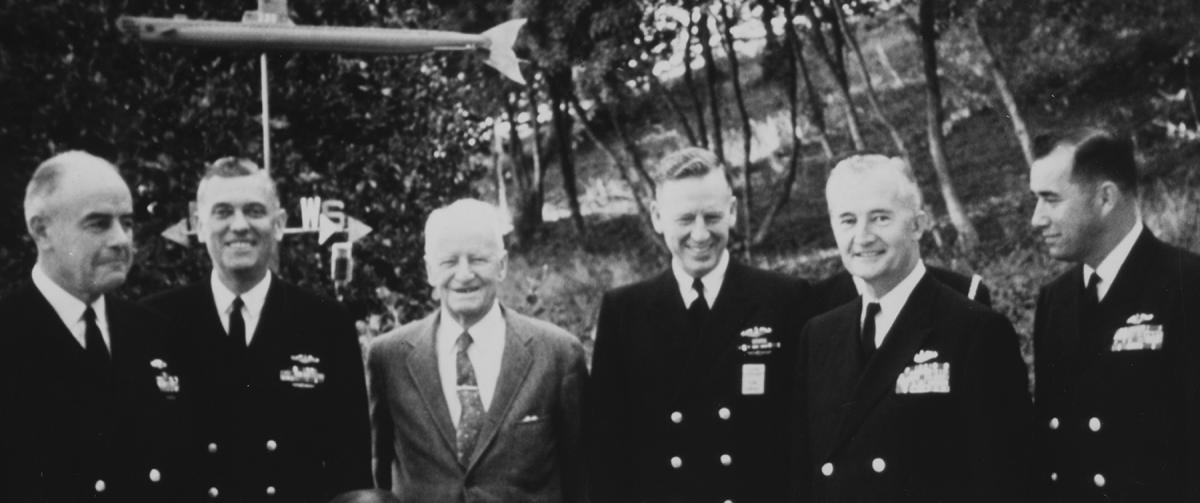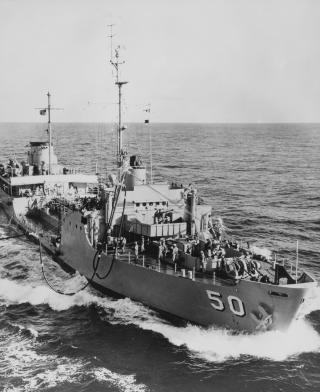I deployed on board the USS Spiegel Grove (LSD-32), the flagship of Amphibious Group 4 during Operation Solant Amity II, from 18 April to 19 September 1961, as part of a goodwill cruise to Africa and the Indian Ocean. The mission was to provide medical and dental equipment and other donated items to developing countries in the region. One of the highlights was a port visit to Libreville, Gabon, to deliver medical supplies to Dr. Albert Schweitzer at his jungle hospital.
Rear Admiral Eugene B. Fluckey, a recipient of the Medal of Honor and the commanding officer of the famous World War II submarine USS Barb (SS-220), was the embarked flag officer. At the time, Fluckey was the youngest admiral in the Navy. Lean, athletic, and very forward-thinking, he was a perfect U.S. representative at the independence ceremonies of the former African colonies we visited during the cruise.
The group consisted of the Spiegel Grove, one of the new Thomaston-class dock landing ships, the destroyer USS Jonas Ingram (DD-938), the tank landing ship USS York County (LST-1175), and the USS Chewaucan (AOG-50), a small, World War II–era auxiliary gasoline tanker designed for inshore refueling.
Built in 1944, the Chewaucan had a maximum speed of 10 knots. AOGs were not built for at-sea/open-ocean operations, so she had to refuel the ships using the close-in method, which made her ill-suited for her assigned role. A lieutenant commanded her, with a warrant officer executive officer and chief petty officers as officers of the deck (OODs). Despite the ship’s deficiencies, her crew performed in a professional manner.
During the midpoint of the cruise, the Spiegel Grove had a scheduled at-sea refueling. Our commanding officer (CO), Captain R. A. Moore (later a rear admiral), set the sea detail, and I was assigned as the sea detail junior OOD (JOOD). The sea was calm, with little or no wind, and the CO’s approach to the AOG was perfect, albeit close aboard, as the close-in method required.
The Chewaucan’s limited speed was not optimum, but the ships in the group had refueled previously without much difficulty. She sent her fuel hoses over, and we began refueling operations as prescribed. But the AOG lost propulsion and sounded the collision alarm. The hoses broke and spilled Navy Special Fuel Oil on both ships until the pumps could be stopped. Despite each ship’s CO doing everything in their power to avoid a collision, the AOG—having lost steering—bumped and slid down the port side of the Spiegel Grove, scraping paint and dousing her side with oil. Fortunately, the damage was cosmetic and quickly remediated.
Captain Moore, who also had been a World War II submariner, directed the quartermaster of the watch to make an entry in the ship’s log that a collision had occurred. Admiral Fluckey, who was on the bridge observing the operation, countermanded the CO and said a collision did not occur. Captain Moore looked in the admiral’s direction but did not immediately respond, at which point Admiral Fluckey loudly proclaimed, “Captain, a collision did not occur.”
I was standing between the admiral and the captain, and it was the most uncomfortable experience of my early Navy career. The bridge team remained absolutely quiet, and you could feel the tension. Admiral Fluckey called Captain Moore to a corner of the bridge and quietly engaged in what appeared to be a serious but one-sided conversation.
I was in awe of Admiral Fluckey for many reasons, but I did not fully realize the importance of his actions until I commanded a ship as a lieutenant.
When I was selected for command, I was the operations officer of a destroyer. My commanding officer cautioned me against taking command at such a junior rank. I remember him saying that much would be expected of me regardless of my relative inexperience. He told me I would either “go to Heaven or to Hell” and warned that the pitfalls were many and varied. I was terribly disappointed hearing this from an old sea dog because command at sea was the ultimate goal for unrestricted line officers. I did not follow his advice and had a very successful command tour—I went to “Heaven.”
Later, though, I recalled that experienced destroyerman’s advice when I heard the old Navy saying, “A collision at sea will ruin your entire day.” And as my career progressed, its validity became readily apparent. Any type of collision or allision—regardless of the cause or contributing factors—usually amounts to a career-ending event. I am aware of numerous cases in which COs did everything by the book—could not have altered the situation in any respect—but nevertheless met their professional demise.
This was not always the case: Ensign Chester W. Nimitz was CO of the USS Decatur (DD-5), a destroyer that went aground on a mud bank while entering Batangas Harbor in the Philippines in 1908. He received a non-career-ending public reprimand. Captain John L. McCrea, commissioning CO of the USS Iowa (BB-61) and former naval aide to President Franklin Roosevelt, grounded the battleship on her shakedown cruise early in World War II. He, too, was officially chastised. But the grounding did not end his career; he acquitted himself in battle and eventually attained the rank of vice admiral.
What would have happened to these fine naval officers—especially in the case of Nimitz—had they been subject to the approach that has prevailed in the surface warfare community since World War II? How fortunate for the Navy and the nation that the grand strategist and architect of victory in the Pacific was not cashiered as a junior officer. I discussed this subject once with an admiral of the British Royal Navy, who opined that the U.S. Navy was overly punitive in these matters. He said his service looked at minor incidents like the Spiegel Grove’s as fender benders and gave the example of driving a taxi in London—sooner or later even the most experienced taxi driver will suffer one.
Later in my career, I had the honor of serving as executive assistant to Admiral William J. Crowe in all or parts of his tours as NATO Commander-in-Chief (CINC), U.S. Allied Forces Southern Europe; Commander, U.S. Naval Forces Europe; CINC Pacific; and Chairman of the Joint Chiefs of Staff. It is natural in these positions to become close to your boss and their families and, because of the multiple tours with Admiral Crowe, I became very close with him.
Much in the style of General George Patton, Admiral Crowe invited me to “ruminate” with and challenge him. He believed that to conceptually define and develop tangible solutions to multidomain problems required provocative debate, not parochialism and sycophancy. Because of this, I told him the “no collision” anecdote about Admiral Fluckey and spoke of my enormous admiration for him.
Admiral Crowe, a diesel submariner, was not surprised and said it was typical of the leadership style of World War II submariners, adding that he had contemplated making a career of surface ships, “but I considered it too chicken”— meaning too hidebound or focused on minutiae. He went on to say that, even so, he found surface warfare officers the most talented and well-rounded officers in the Navy, partially because of their opportunities for senior service colleges, staff assignments outside of the Navy, and graduate education. I later related the incident to Admiral William N. Small, a naval aviator, and he said, “The problem with you people [surface warfare officers] is that you eat your young.”
My admiration for Admiral Fluckey was rekindled years later when I read his book Thunder Below, about the exploits of the Barb, which sank the most tonnage of any U.S. submarine in World War II. He used the book’s royalties to pay the travel expenses of the Barb’s crew to attend the ship’s reunions.
I followed the career of the lieutenant who commanded the Chewaucan, and he went on to several other commands, including a destroyer squadron, and he wrote a much-admired book on ship handling. A stroke of leadership by a thoughtful leader at a crucial moment saved the career of a talented officer. Admiral Eugene Fluckey was more than a hero. He was a special human being who adhered to one of the most important tenets of leadership: Take care of your people.
Editor’s Note: An earlier version of this article appeared in June 2020 in the “Thursday Tidings” newsletter for the Naval Historical Foundation.




